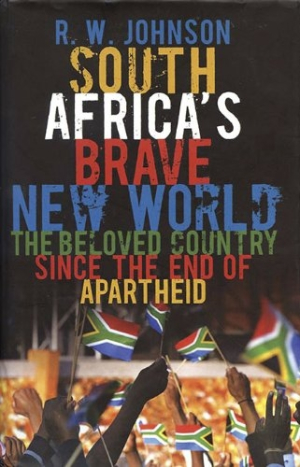South Africa's Brave New World
The Beloved Country since the End of the Apartheid
As a white student amid the 1960s surge of anti-colonial liberation movements, R.W. Johnson turned to the African National Congress’s (ANC) blend of black nationalist and Marxist ideas. His activism brought him into early contact with central figures in “the Struggle” against apartheid. After a Rhodes Scholarship, he spent the next twenty-six years abroad as a political historian and journalist.
Meanwhile, newly independent African nations became Cold-War battlefields, and swiftly learned that freedom didn’t guarantee prosperity. Many fell prey to warlords and dependency upon ideological sponsorship rather than functioning economies. Elsewhere—as in South Africa—white regimes mounted increasingly violent last-ditch defenses of the racial inequities embodied in apartheid, which hung on until the late 1980s. This is the jumping-off point for Johnson’s ninth book; he writes here of the years since 1994, when Nelson Mandela was joyously installed as the Beloved Country’s first post-apartheid president.
Mandela’s elevation was widely hailed as launching a new golden age for Africa. While his courageous personal history, stirring rhetoric, and guileless manner made him an ideal symbol for a new South Africa, long imprisonment and isolation left his charisma intact but untested by the demands of practical government that sparked vicious infighting among lesser ANC leaders. In Mandela, the outside world saw the promise of peace and South Africans looked forward to prosperous self-rule under a wise, grandfatherly hero. It was a beautiful vision—one that brought Johnson back to Johannesburg. Since then, however, his attitude has changed.
Behind Mandela’s back, he now claims, an African-nationalist society in which a white elite was simply replaced by a black one was born, ignoring the fact that the new rulers had been systematically denied the necessary training to govern. Those who resisted this and fought for a different kind of nation were marginalized, sent packing, or simply assassinated—a chilling reprise of Soviet-style tyranny. Mandela alone was iconic enough to be completely immune to ANC reprisal, but according to Johnson, from the outset he was sidelined, with no real authority.
Johnson’s case is persuasive, although perhaps overly detailed for many readers; his stories are often riveting, if usually discouraging; and his cast of characters is fascinating, from tragically high-minded true believers like Chris Hani to high-profile self-promoters like Mandela’s larger-than-life wife Winnie. In this narrative, Mandela was the unimpeachable figurehead and unwitting patsy for a new, cynical generation of leaders. Thabo Mbeki, ANC second-in-command, is the arch-villain, corrupt, autocratic, and paranoid. Double-dealing, byzantine conspiracies, and unimaginably strange bedfellows are a constant subtext, including assassination plots involving infamous apartheid torturers working hand in glove with equally criminal ANC counterparts.
The story of Hani’s murder is just one of dozens which sound like the stuff of spy novels. Widely popular, scornfully incorruptible, and party to the ANC’s most explosive secrets, Hani paid with his life within weeks of threatening to reveal various of his colleagues’ misdeeds to Mandela. As time passed, the ruthlessness of post-apartheid power-players has driven the best and brightest of black and white alike—economists, technocrats, and other professionals indispensable to a successful modern country—to seek refuge in safer parts of the world. Once again, South Africa has been victimized.
This is a serious work intended first for Johnson’s academic and journalistic peers, who are already familiar with the history of South Africa in general and apartheid in particular. Less well-informed readers with a sense of purpose can also glean a great deal; Johnson writes with brio and passion.
Nonexperts should be aware that Johnson’s views are controversial, and this unusual mix of reportage, reassessment, and personal animus may be at once too impartial for some and too polemical for others. His critics assert that he’s too ready to credit rumor as fact and his impressive sourcing can be less conclusive than it appears, but the consensus is that his drift rightward is that of a maverick historian rather than a revisionist crank. Many feel that Johnson is reacting with the bitterness of a betrayed idealist when he warns that South Africa is on the brink of collapse.
His decision to close on a more positive note hints that he is not unaware of this criticism. He cites Mbeki’s ignominious ouster in 2008, for example, as evidence of slim hope for a more stable South Africa; however, his underlying assessment is that Mandela’s inauguration in 1994 actually signaled, not a triumphant conclusion to struggle, but the start of a far more intricate and uncertain political project. Even Johnson’s detractors concede he’s made a substantial, if flawed, contribution to our understanding of recent South African history. Highly recommended.
Reviewed by
Peyton Moss
Disclosure: This article is not an endorsement, but a review. The publisher of this book provided free copies of the book to have their book reviewed by a professional reviewer. No fee was paid by the publisher for this review. Foreword Reviews only recommends books that we love. Foreword Magazine, Inc. is disclosing this in accordance with the Federal Trade Commission’s 16 CFR, Part 255.

